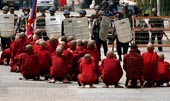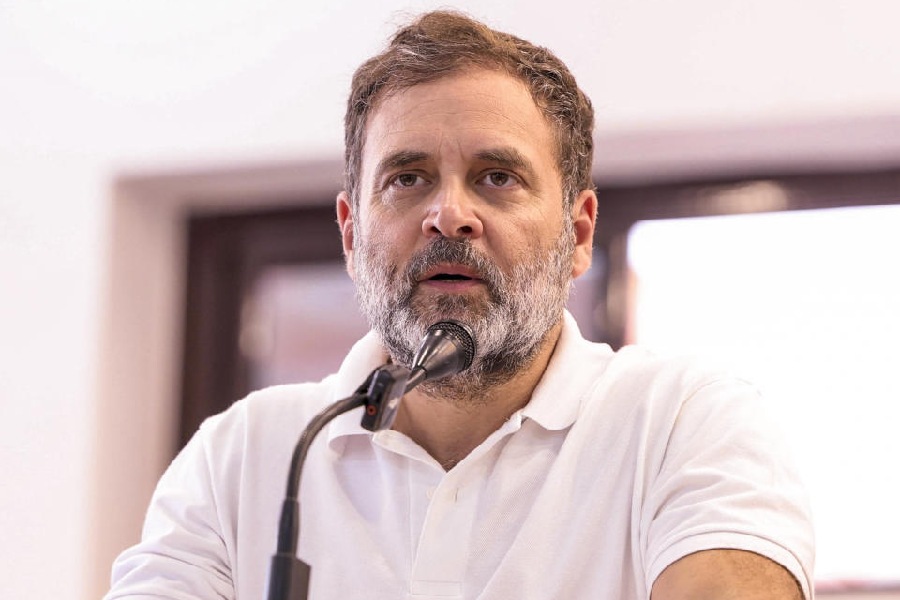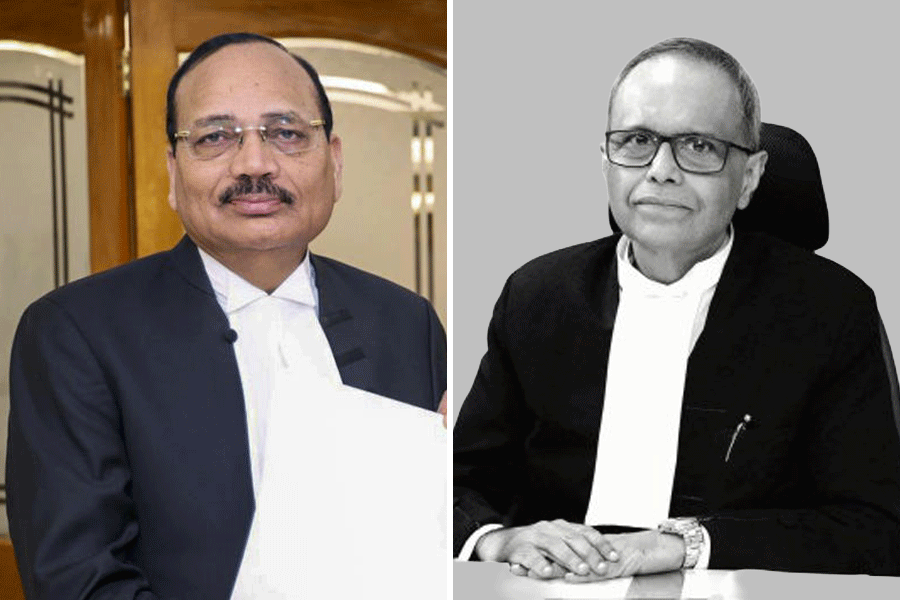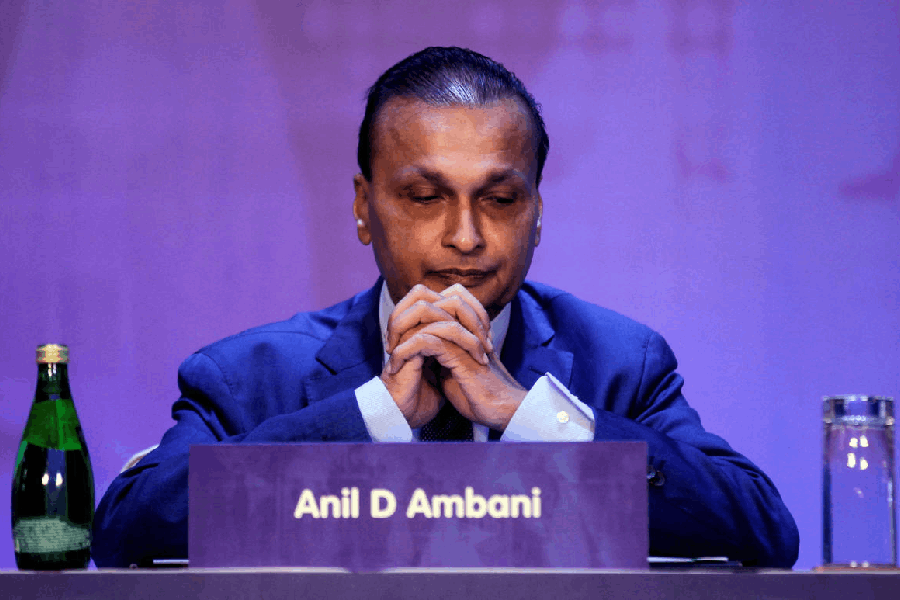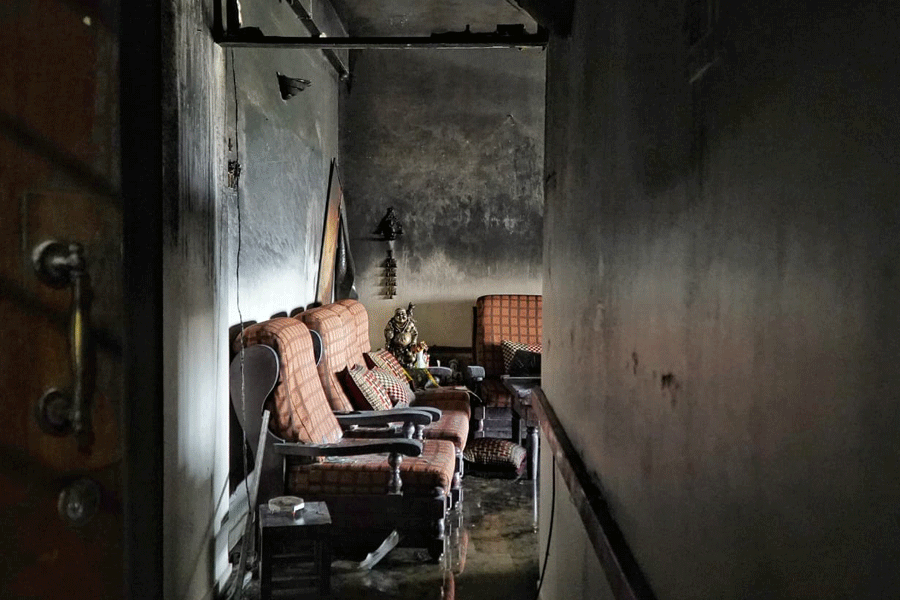 |
| Monks sit on the road in protest after they were prevented from proceeding to the Shwedagon Pagoda in Yangon, Myanmar, on Wednesday. (Reuters) |
Yangon, Sept. 26 (Reuters): Seething crowds of Buddhist monks and civilians filled the streets of Myanmar’s main city today, defying warning shots, tear gas and baton charges meant to quell the biggest anti-junta protests in 20 years.
Two monks and a civilian were killed, hospital and monastery sources said, as years of pent-up frustration at 45 years of unbroken military rule in the former Burma produced the largest crowds yet during a month of protests.
Some witnesses estimated 100,000 people took to the streets despite fears of a repeat of the ruthless suppression of Myanmar’s last major uprising, in 1988, when soldiers opened fire, killing an estimated 3,000 people.
“They are marching down the streets, with the monks in the middle and ordinary people either side. They are shielding them, forming a human chain,” one witness said over almost deafening roars of anger at security forces.
As darkness fell, however, people dispersed ahead of a dusk-to-dawn curfew. The streets were almost deserted.
 |
| A monk injured after clashes in Yangon. (AFP) |
In the second city of Mandalay, also under curfew, the Asian Human Rights Commission said there was no opposition to 10,000 monks protesting against grinding poverty in a country seen 50 years ago as one of Asia’s brightest prospects and now one of its most desperate.
At the start of an extraordinary afternoon, riot police fired tear gas at columns of monks trying to push their way past barricades sealing off the Shwedagon Pagoda, Myanmar’s holiest shrine and the starting point of more than a week of marches.
As many as 200 maroon-robed monks were arrested at the gilded shrine as the Buddhist priesthood, the country’s highest moral authority, went head-to-head with the might of the military.
“This is a test of wills between the only two institutions in the country that have enough power to mobilise nationally,” said Bradley Babson, a retired World Bank official who worked in Myanmar.
 |
| A monk shows his wounds after the crackdown. (AFP) |
“Between those two institutions, one of them will crack,” he said. “If they take overt violence against the monks, they risk igniting the population against them.”
The junta, whose leaders remain hunkered down in a new capital 385km to the north, had tried to keep the monks off the streets, sending trucks of soldiers and police to block six activist monasteries early in the morning.
After mass protests on Monday, a senior general also warned top abbots to rein in their young charges or face the consequences. Loudspeakers blared out threats that military force could be used against illegal gatherings.
People took to the streets regardless and roared their anger as some monks were beaten and manhandled by riot police as they were taken away from the Shwedagon.
The generals also rounded up more prominent dissidents, including comedian Za Ga Na, who had urged people to take to the streets.
Ranks of riot police remained outside the lakeside home of detained opposition leader Aung San Suu Kyi to ensure no attempt was made to pluck the 62-year-old Nobel laureate from house arrest.
Suu Kyi has spent much of the last 18 years in prison or under house arrest. Pictures of her praying with monks on Saturday were the first time she had been seen her most recent detention in May 2003.
In the northwest coastal town of Sittwe, which has seen some of the biggest crowds outside Yangon, residents said 10,000 took to the streets today, the Buddhist holy day.
The 27-nation EU said it would “reinforce and strengthen” sanctions against Myanmar’s rulers if the demonstrations were put down by force.
The US and the EU condemned the violence against demonstrators and asked the UN Security Council to consider sanctions against Myanmar. The Council planned to meet on the Myanmar crisis later. China has been making an effort recently to let the generals know how worried the international community is, a Beijing-based diplomat said.

